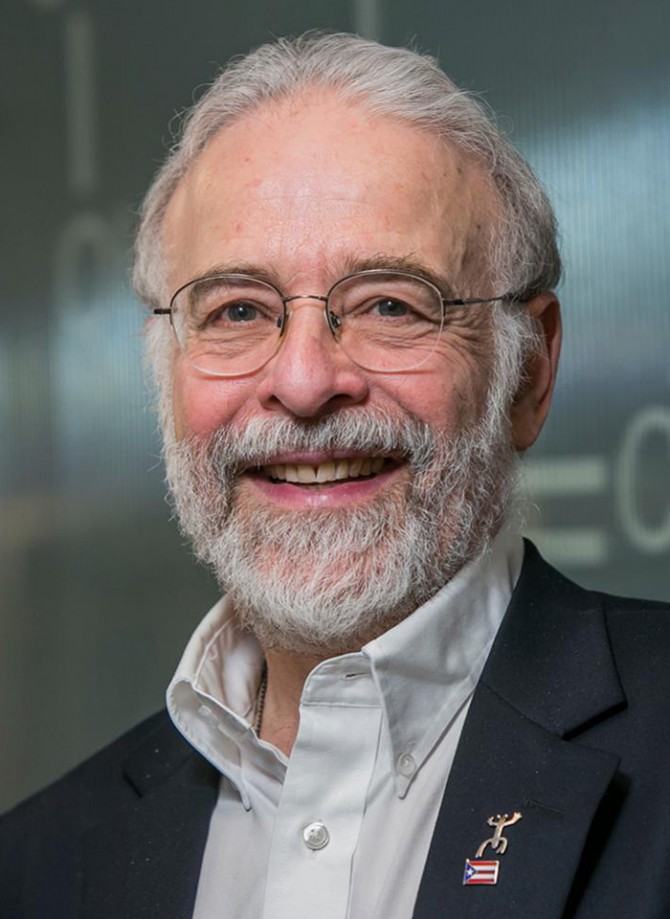$10.75M grant aids next-gen fuel cell development
By Tom Fleischman
Fuel cells could someday power numerous devices – automobiles and mass transit systems, buildings, and virtually any type of portable electronic device.
Unlike batteries, which eventually run out of power (and thus need to be recharged), a fuel cell will continue to generate electrical energy as long as it has a fuel – usually hydrogen – and oxygen or some other oxidant necessary for the complete electrochemical reaction.
Fuel cells are significantly more efficient than internal combustion engines, but one of their main drawbacks is cost: Most current fuel cells employ acid-based electrolytes, meaning their activity is dependent on catalysts made from expensive precious metals such as platinum.
Héctor Abruña, the Émile M. Chamot Professor in the Department of Chemistry and Chemical Biology and director of the Energy Materials Center at Cornell (EMC2), in collaboration with other faculty members, has been exploring electrocatalysis in alkaline (non-acidic) media, which could result in high-efficiency and high-performance fuel cells at a greatly reduced cost.
To further that effort, Abruña will lead the recently funded DOE Center for Alkaline-Based Energy Solutions (CABES), part of the Energy Frontier Research Center (EFRC) program supported by the U.S. Department of Energy. CABES, dedicated to the development of advanced fuel cell technologies in alkaline media, has been awarded a four-year, $10.75 million grant from the DOE Office of Science; the project officially begins Aug. 1.
“We’re, of course, very excited … we’re looking to change the fuel cell paradigm,” Abruña said. The CABES team includes physicists, chemists, engineers and materials scientist from Cornell as well as five other universities and two national laboratories.
CABES is one of 42 centers awarded grants totaling $100 million in fiscal year 2018; subsequent FY funding will be contingent on congressional appropriations.
Since its establishment in 2009, the EFRC program in the DOE’s Office of Basic Energy Sciences has brought together multidisciplinary teams of researchers to tackle challenging scientific problems and lay the foundations for future energy technologies.
In his proposal to the DOE, Abruña described the impact he felt that work at CABES could ultimately have: “To our knowledge, there is currently no integrated effort focused on alkaline electrocatalysis … the proposed work could establish the basis for ushering in a highly energy-efficient, environmentally benign, alkaline-based energy technology society.”
Abruña and the CABES team will attack the challenge from all sides – integrating theory and computational methods, synthesis of novel materials, and the development of experimental tools to provide real-time characterization of systems in operation.
“We believe this is where the frontier in fuel cell research will be,” Abruña said. “Why? A reasonable fuel cell today is 60 to 70 percent efficient, but we believe it can be even better. An internal combustion engine, on a good day, is 25 percent [efficient]. There’s the ‘why.’”
Cornell-affiliated members of CABES include professors Tomas Arias (physics), Lena Kourkoutis, David Muller (applied physics); Joel Brock (applied physics and director of the Cornell High Energy Synchrotron Source); Peng Chen, Geoffrey Coates, Frank DiSalvo, and Robert DiStasio (chemistry); Paul Mutolo ’94 (chemistry and director of external partnerships at EMC2); Emmanuel Giannelis (materials science, vice provost for research and vice president for technology transfer, intellectual property and research policy); and Andrej Singer and Jin Suntivich (materials science).
Other contributors hail from Binghamton University, Yale University, Pennsylvania State University, the University of Wisconsin, Carnegie Mellon University, the National Renewal Energy Laboratory and Los Alamos National Laboratory.
In addition to the federal funding, Empire State Development and the New York State Energy Research and Development have both pledged state funding ($1 million and $250,000, respectively) to support CABES.
Media Contact
Get Cornell news delivered right to your inbox.
Subscribe

